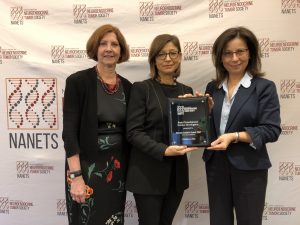Antibody-drug conjugate aims to combine the benefits of targeted therapy and chemotherapy

Renata Jaskula-Sztul, PhD, Assistant Professor of Surgical Oncology at the University of Alabama at Birmingham School of Medicine has been awarded the North American Neuroendocrine Tumor Society (NANETS) Basic/Translational Science Investigator (BTSI) Award, which is funded by NETRF.
Dr. Jaskula-Sztul’s study, Novel antibody-drug conjugate (ADC) for pancreatic neuroendocrine tumor (PanNET) Targeted Therapy, will explore a novel delivery system for therapy, using an approach designed to increase precision and efficacy while reducing risks.
Dr. Jaskula-Sztul’s project addresses the critical need for new therapeutic options for pancreatic NETs. She will be using a natural cytotoxic agent bound to an antibody that specifically targets the surface receptor SSTR2 on pancreatic NETs. “This is an exciting project that employs a targeting approach to killing NET cells while limiting systemic toxicities,” said Effie Tzameli, Director of Research. “If successful, this ADC will help reduce tumor burden of SSTR2 positive NETs.”
“Dr. Jaskula-Sztul’s project on testing antibody-drug conjugates as a potential drug for NET will generate new and exciting information that will form the foundation for future grants,” said NANETS Chair James Howe, MD.
Dr. Jaskula-Sztul has published more than 40 papers, and as a co-investigator, she has received funding for five research grants on targeted drug delivery to neuroendocrine tumors.
Learn about ADCs
Like a missile carries an explosive warhead, an antibody-drug conjugate (ACC) uses an antibody to carry a cytotoxic agent to cancer cells.
